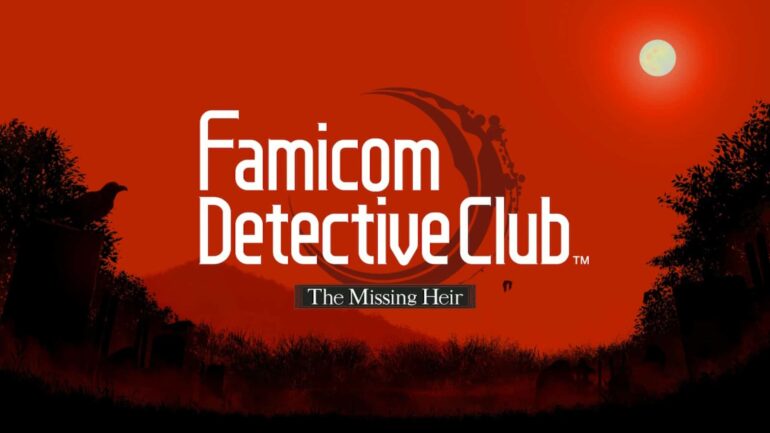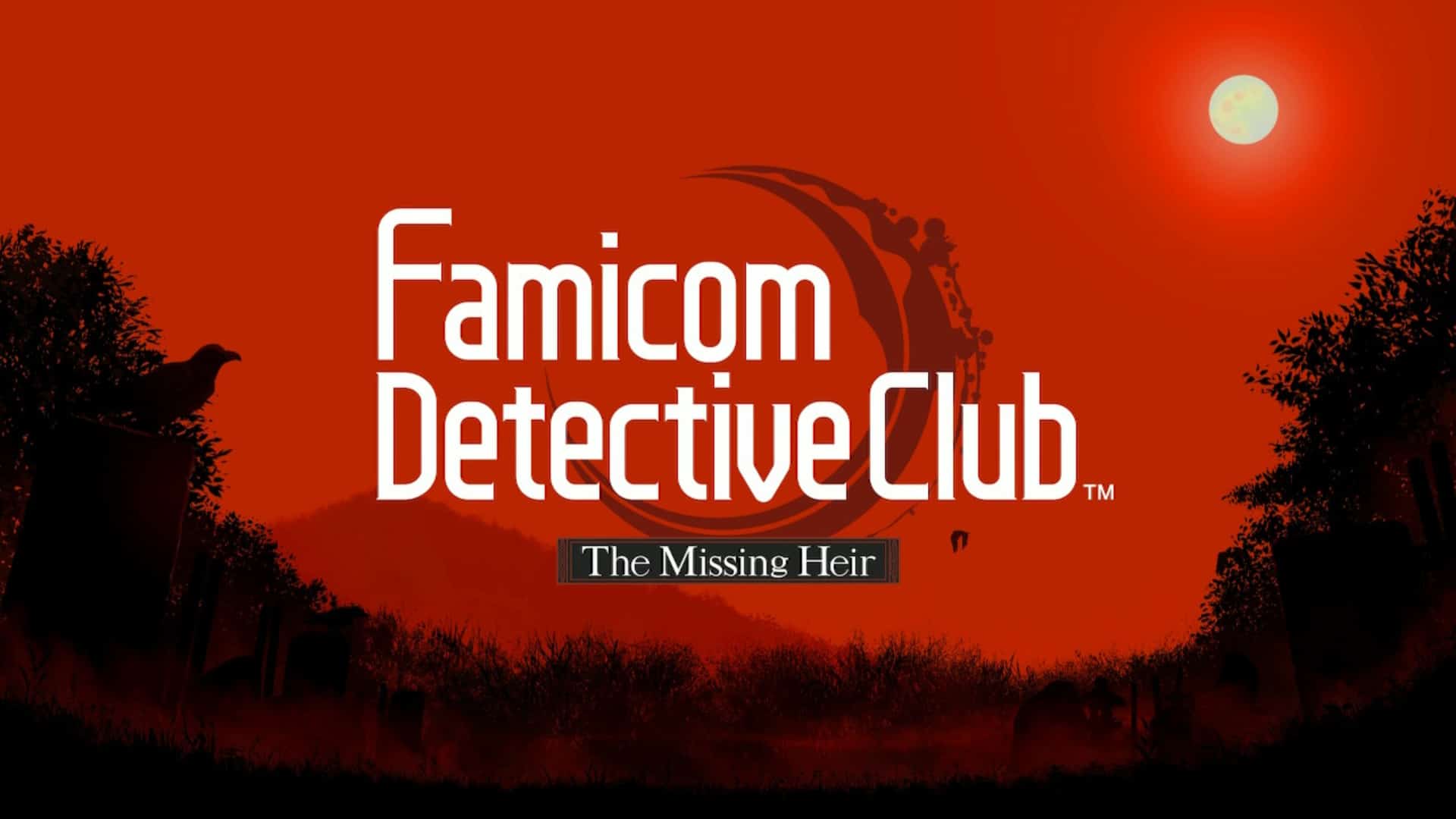When I was young I desperately wanted to be a lawyer. I came to this decision not by reading literature about law, nor by the advice of a parent. Instead, I decided I wanted to be a lawyer thanks to the preppy, do-gooder attitude of a finger-pointing, spiky-haired, good-for-nothing lawyer by the name of Phoenix Wright. The Ace Attorney series was not only one of the landmark franchises of my childhood, but it was also my introduction to visual novels as a genre and concept. I would go as far as to argue that the Ace Attorney games are nothing short of masterpieces. Famicom Detective Club: The Missing Heir has been heralded as the grandfather of the Ace Attorney franchise. But in my opinion, it is a confused, messy visual novel that, at best, is an illogical nightmare I want nothing more than to forget about and move away from.

“Famicom Detective Club: The Missing Heir features some truly necessary quality of life changes.”
Famicom Detective Club: The Missing Heir does do some things right. For one, it is a visually impressive game, with striking backgrounds bringing its phenomenally vibrant setting to life. From lush verdant valleys overshadowed by an ominous mountain to the intricately detailed bedroom of a deceased magnate overlooking a sparkling koi pond, each location is lovingly brought to life thanks to the enhanced visual style.
The slight movements made by the various characters populating each location adds a level of realism and life to them that makes for a far more immersive game. Additionally, the sound effects that permeate throughout each scene, whether it’s the chirping of a cicada or the clanking of a train guards keys as he nervously twitches, are astounding and further elevated my sense of immersion.

Famicom Detective Club: The Missing Heir also features some truly wonderful quality of life changes. There’s the option to recap the story before you launch into a save. I can imagine this would be a lifesaver for those who’ve been away from the title for a while. There’s also the option to read about the cast of characters in an easily accessible notebook. This covers all of the various details you’ve accumulated about them throughout the course of the game. Once again, this is extremely helpful for those who’ve perhaps neglected the title for some time or have forgotten information between play sessions.
“Famicom Detective Club: The Missing Heir is perhaps one of the worst games I’ve played this year.”
Most importantly, Famicom Detective Club: The Missing Heir is a brilliantly written mystery game with a fantastically intriguing plot. There are numerous characters, each fully voice-acted, with wonderfully distinct personalities that help elevate an otherwise traditional and tropey murder mystery.
The vast number of locations and characters you can visit and converse with help keep the narrative feeling fresh. Whether it was the internal monologue of the amnesiac protagonist or the delusional rantings of a grieving nephew, the writing was superb. Had it not been for the utterly lacklustre gameplay, I may have been genuinely gripped throughout my time with Famicom Detective Club: The Missing Heir.

Unfortunately, this is where my praises end. Famicom Detective Club: The Missing Heir is perhaps one of the worst games I’ve played this year. In Famicom Detective Club: The Missing Heir, you must travel around various locations, interrogate the colourful cast of characters, and interact with your surroundings. This is not too dissimilar to the detective segments in an Ace Attorney game. Alas, where Famicom Detective Club: The Missing Heir falls flat is in its setting up of conventions and precedents for players to understand how they’re supposed to progress.
“I found myself trying to figure out what I needed to do next in order to progress, only to realise I needed to use one of the many completely worthless mechanics.”
In puzzle games, it is generally considered good game design to start the player off with an easy puzzle. This is to help them understand the basics for future levels. Famicom Detective Club: The Missing Heir starts you off by establishing that various mechanics are intended to accomplish certain tasks, only to later turn them on their head and have them accomplish vastly different things. Take for example the Look/Examine feature. You can use this tool to investigate your surroundings. But for the majority of your experience, this will simply net you with a brief description of what you’ve clicked on. The protagonist will comment on the vastness of the sky or explain what an X-Ray is. Essentially, the game sets this mechanic up to be entirely useless.

However, at certain points throughout the game it is imperative you use this feature to progress. This is entirely counterintuitive to what Famicom Detective Club: The Missing Heir had initially set up as a precedent. The same applies to the “Remember” function and the numerous other abilities that come and go as they please. Ultimately, this resulted in me ignoring them for the majority of my playthrough. I never felt it was important to use these features outside of gaining flavour text for the game to help build immersion.
Unfortunately, on the rare occasion these mechanics were necessary to progress, this would come back to bite me. I would find myself stuck desperately trying to figure out what I needed to do in order to progress, only to realise I needed to use one of these completely worthless mechanics.
“There is no way of telling which of the questions you’ve already asked which left me spending upwards of 30 minutes clicking through every available dialogue option.”
Another enormous oversight made by the developers is the lack of indication of what options you’ve used and what you’ve left to exhaust. You’re given various topics to discuss with the characters you meet. This continues to grow the more you progress through the narrative. These typically involve questions about the other characters you’ll meet, or, less frequently, about a specific item or event that has occurred.
However, there is no way of telling which of these questions you’ve already asked or which will bear you any meaningful results. Had the remaining questions been highlighted, or even the ones I’d already asked removed, then I wouldn’t have spent upwards of 30 minutes clicking through every available dialogue option with all characters present.

This is worsened by the fact that, at times, the dialogue options need to be selected multiple times for you to progress. Unfortunately, this is quite literally never apparent. This only exacerbates the frustration I felt when I realised I’d wasted so much time listening to the protagonist tell me what a curtain is.
In combination with the lack of precedent set up for the in-game mechanics, all this does is drag the game to a screeching halt every time you have to talk to a new character. There’s no hints or sense of direction as to what you’re supposed to do next or inquire about. More often than not, you’re restricted to one location, which only adds to that sense of frustration. I felt as if I’d exhausted all options, not that I had just missed something in another room.
“Is it really worth playing if 90% of the time you’re just going to be looking up what you have to do next?”
Of course, all of this is alleviated by the myriad of walkthroughs and guides that will appear a few weeks after launch. But I have to ask: is it really worth playing if 90% of the time you’re just going to be looking up what you have to do next? You’re either stumbling your way into the answers or reading reams of text that tell you exactly what you need to do. It takes all the mystery and fun out of it. Unfortunately, for people who wasted money on this, that’s exactly what they’ll have to do.
Famicom Detective Club: The Missing Heir may be pleasing on a surface level, but once you’ve started playing, it’s readily apparent that this is a terrible game. All of these issues would be avoidable if the developers put any thought into the player experience. It’s not that the game needs to hold my hand throughout the experience. It just needs to establish basic rules, and make it so that the options available to me are clear.

By obfuscating the way forward, all it does is make the game a frustrating slog to progress through. Rather than a cryptic mystery you unfold. Even the most recent Ace Attorney game has an auto-advancing story mode that lets players skip through tricky scenes. It’s not about making the game easier but instead improving upon the archaic game design of the ’80s. Allowing players the option to avoid the headache that comes with an obscure puzzle design. Needlessly complex narrative progression shouldn’t be something we have to ask for. That’s just bad game design.







